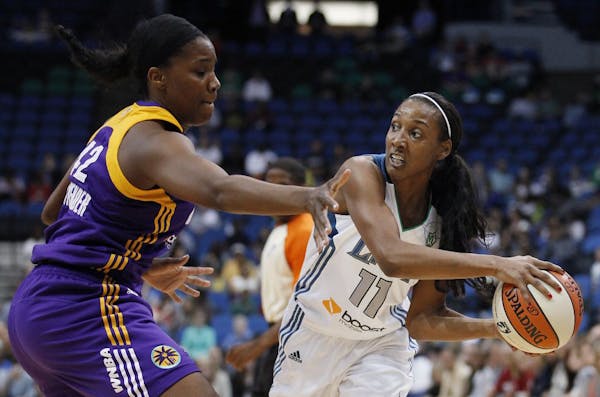Seimone Augustus spent eight seasons among the nearly three-quarters of WNBA players that also compete overseas.
The Lynx star guard/forward played in the Russian Premier League and Turkish women's basketball league during WNBA offseasons to earn a better living. That means competing at high level year-round and little rest for the players' bodies.
However, this has become routine for even the WNBA's best stars and it won't change unless salaries around the league increase. Augustus addressed the wage discrepancy in the WNBA compared to international professional leagues in a recent VICE Sports and ESPN Film for Carmelo Anthony's The Clubhouse.
"I didn't know coming in as a rookie I was only going to make $40,000," said Augustus, now an 11-year WNBA veteran. "Once we hired an agent, it was like 'Well, where do you want to play overseas?' I was like, 'Overseas?' It's not a lot of options that pay big money and Russia is one country that consistently pays big money."
The maximum salary a WNBA player could earn in 2016 was $106,000. In Russia, a player can earn up to $325,000. In China, Brittney Griner reportedly earned $600,000.
Only a limited number of WNBA stars make significant income from endorsement deals. Even the 2016 WNBA MVP Nneka Ogwumike competes overseas. Other Lynx stars Maya Moore and Lindsay Whalen also have played internationally.
Augustus, 32, would like to see the WNBA allow for more team sponsorships and players tap into endorsement deals specific to women.
"Without a doubt, we should be able to get those sponsorship deals and really promo that," Augustus said. "There are just some areas we haven't tapped into yet. I don't know why, but there's a lot of stuff that we can actually get involved with that men cannot touch. You're not going to catch a man on a Tampax commercial. There's many things that women use on a day-to-day basis that the league can use and we can use to get where we want to go."
Augustus is not playing overseas this offseason, which should benefit her body when WNBA training camp starts in April. The international seasons typically end just before the WNBA season and allow little to no time for players to recover.
"It's just like a lot of wear and tear on the body," Augustus said. "Overseas we play 38 almost 40 minutes a game. They hardly ever want to take the Americans out of the game.
"Obviously, we have to come out and put quality basketball on the floor. It's very hard at times to have quality basketball and have players that are at 100 percent when we play year-round and we're all kind of banged up. We're doing the best that we can with the damage that's been done to our body and very little break."
Augustus had a lot more to say about the wage discrepancy and the grueling year-round schedule. Watch the full The Clubhouse short:
Wednesday's prep sports results
Dallas Stars clinch top seed in Western Conference by getting to overtime against Blues

Joel Embiid scores 23 points, has the big assist as 76ers beat Heat in play-in to earn No. 7 seed
Coby White scores career-high 42 points as Bulls roll past Hawks 131-116 in play-in game

